If vegans don’t want to harm animals, why do vegans not eat eggs? The answer is not as straightforward as you might think.
Most people think meat is the main food that vegans don’t eat because there is obvious harm to an animal involved. So, can vegans eat eggs, then?
However, veganism is defined as a lifestyle seeking to reduce the exploitation of animals as much as possible and practicable. And chickens are included in this definition, of course!
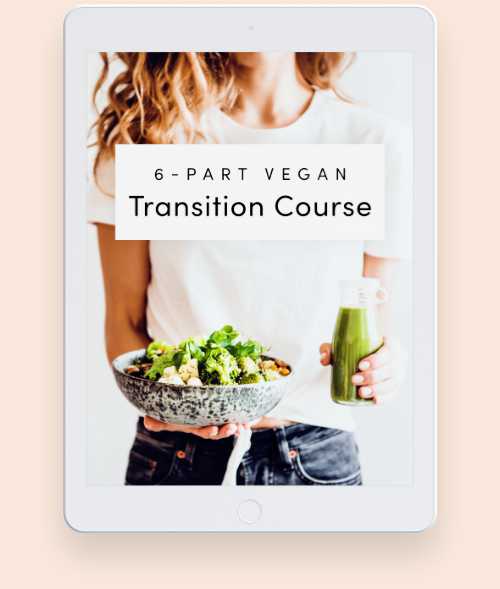
join our free vegan course!
Learn how to thrive on a plant-based diet with practical tips & a 3-day meal plan!
But do hens suffer or die to produce eggs for us? Are backyard eggs ethical and vegan?
Find out more in this article and check out our related guides to see if bread, ketchup, soy, or olive oil is vegan.
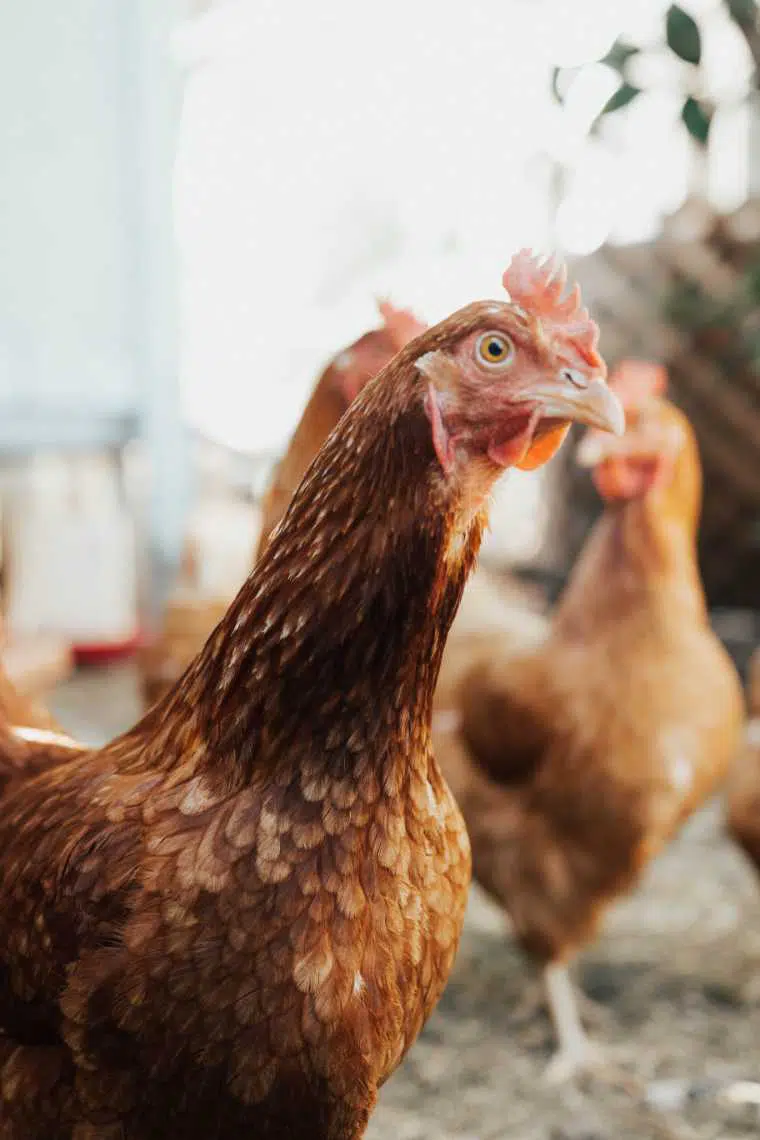
Do vegans eat eggs?
Eggs are not vegan because they come from an animal and are animal products. However, if no hen, goose, or duck had to suffer for egg production, technically, eggs could be vegan.
This answer might surprise you because it’s not the dogmatic “vegans don’t eat anything that has to do with animals.”
Here are some of the reasons why vegans don’t eat eggs and why they are not part of a fully plant-based diet.
Why do vegans not eat eggs?
Some people think that it’s okay to eat eggs because the act of taking them from the chicken doesn’t harm it. Plus, wouldn’t it just go to waste if we didn’t eat it?
Let’s shed some light on this topic.
Suffering & slaughter
Chickens are sentient beings who feel pain and can suffer.
In commercial egg production, they are objectified and used as commodities to make profit. Chickens are selectively bred to produce an enormous amount of eggs and once they aren’t “productive” enough anymore, they are sent off to slaughter.
On their way to the slaughterhouse, they are roughly stuffed into crates and can suffer from broken legs and wings, lacerations, bleeding, dehydration, heatstroke, hypothermia, and heart failure; millions die before reaching the destination.
And the end of their lives at the slaughterhouse isn’t quick or painless, either — some are still conscious when their throats are slit or when plunged into the scalding tank for feather removal.
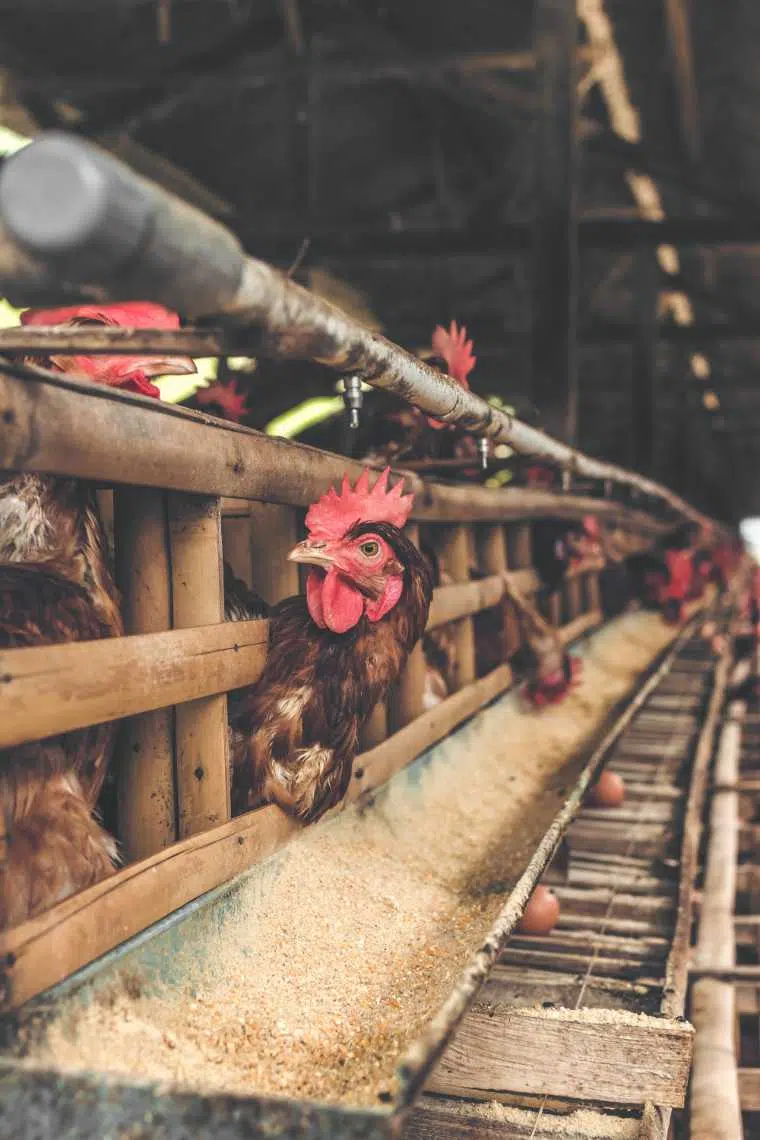
Factory farms
Nobody would argue that today’s large farms offer good conditions for the animals (or the workers there, mind you).
Female chickens are held in tiny cages, unable to spread their wings, giant warehouses holding hundreds of thousands of birds. Neither their basic biological nor behavioral needs are being met.
The birds are crammed so closely together that although normally clean animals, they are forced to urinate and defecate on one another.
The bad conditions and huge amount of eggs the hens have to produce (300 eggs per year compared to 10-15 eggs they would lay in the wild) leads to many diseases and early demise.
Surviving birds are often forced to live with their dead cagemates, who are sometimes left to rot.
Mutilation & exploitation
To avoid picking each other, little hens will get the tip of their beaks cut off (which is done with a hot blade and without a painkiller, a procedure comparable to a human being amputated). Many birds die of shock on the spot.
To maximize their egg production, hens are being starved and exposed to artificial light for many hours per day.
Male chicks are culled
Breeding chickens for egg production means both male and female chicks are being born.
However, since the egg-laying chicken breed doesn’t provide much meat and isn’t economical to raise for that purpose, male chicks who obviously cannot lay eggs are being culled just hours after birth.
They are either thrown in a dumpster and left to die, tossed in garbage bags and suffocated, being ground up alive in meat grinders, or put in little gas chambers. This happens to around 260 million male chicks each year in the US alone!
Read more about the most disheartening factory farm statistics here.
Reasons to Go Vegan →
Can vegans eat eggs from their own chickens?
Let’s paint a lovely picture of a poor hen that was once on a factory farm and has been rescued to live her life out in a vegan’s backyard.
Could there be anything wrong with that?
While this chicken’s life is certainly so much better now compared to all of her peers and she’ll invariably lay eggs, it’s probably not the best idea to pick them up and eat them.
Especially if you go ahead and sell these eggs, you try to profit off of a sentient being, which creates a slippery slope!
This backyard chicken’s eggs may seem like a waste product but if her eggs are always removed, it creates the need to keep on laying more eggs — a process that can be very exhausting to a chicken’s body.
It’s much better to let the hen eat her own eggs or prepare them in a way she likes and feed them back to her to replenish vital nutrients such as calcium.
If you genuinely care about your chickens, you need to treat them like a beloved cat or dog. Would you pay hundreds of dollars for their treatment if they get sick? Or do you see your relationship more like an exchange of goods?
This best-case scenario doesn’t even include the more common case where hens are not rescued but bought from a hatchery where they are definitely seen as a commodity.
One situation in which it could be okay as a vegan to eat eggs from your rescued backyard chicken is this: the hen doesn’t care for the egg and it would definitely rot. In this case, why not give it to someone who usually buys eggs from a supermarket?
This would further decrease the demand for eggs.
Are there vegans who eat eggs?
There’s a new term around called “veggan” which refers to people who are otherwise vegan but consume eggs. If they don’t get these eggs from dumpster diving at supermarkets or similar “freegan” methods, they don’t really live by vegan principles — despite confusingly similar term.
A better term for people who eat eggs but no other animal products is “ovo-vegetarian” and they aren’t vegan for ethical reasons.
Are egg whites vegan?
Just like the whole egg, egg whites are not vegan, either.
Some people might confuse healthy eating with vegan diets and because egg whites are referred to as the healthier option compared to a whole egg, the question of whether egg whites are vegan might arise.
Luckily, there are great vegan replacements for eggs and eggs whites which we’ll share with you below!
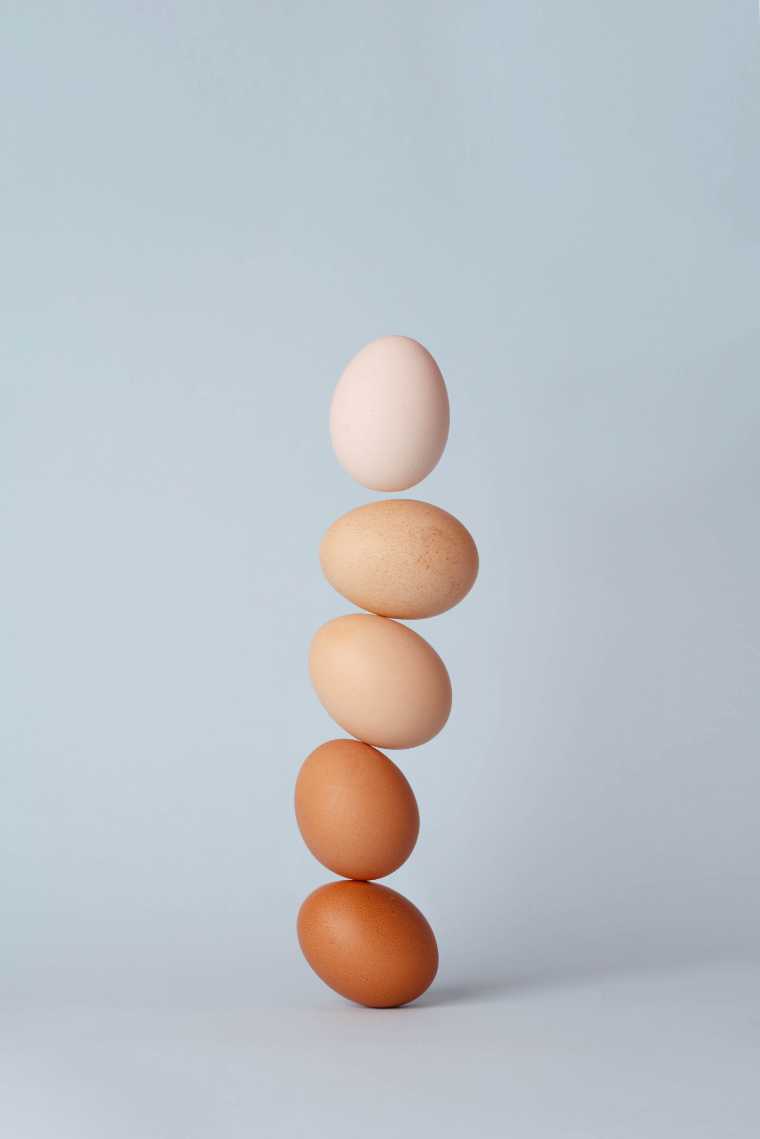
Why are eggs bad for you?
There are a couple of health reasons why you should limit your egg consumption. However, we totally acknowledge that eggs contain vital nutrients and can be part of a healthy diet!
Cholesterol & heart disease
First and foremost, they are high in saturated fat, which raises cholesterol levels and increases the risk for heart disease and type 2 diabetes.
A single egg contains around 370 grams of dietary cholesterol, a nutrient that our bodies produce and which can be harmful in excess.
This recent 2021 study suggests that intakes of eggs and cholesterol are associated with higher all-cause, cardiovascular disease and cancer mortality.
Salmonella
The inside of eggs can contain Salmonella germs that can make you sick — especially if you eat raw or lightly cooked eggs.
Common symptoms include vomiting, diarrhea, cramps and fever, which can last for 4-7 days.
There are several ways to reduce your chance of getting a Salmonella infection not only from eggs but also from meat, fruits and vegetables.
Longevity
When it comes to premature death, “the results were particularly strong when people swapped plant protein for eggs (24% lower risk in men and 21% lower risk in women).”
Plus, if you replace animal protein with plant-based protein, your fiber intake increases, your risk for certain diseases decreases and weight is much easier to manage!

Vegan egg alternatives
There are different ways to replace eggs with some simple vegan food swaps!
- Tofu for scrambled eggs or pureed for baking
- Chickpea flour for omelets
- Aquafaba (chickpea liquid) recreates egg whites in baking
- Kala Namak (black salt) for the sulfurous flavor of eggs
- Mashed banana, apple sauce, mashed avocado or vegan yogurt in baking
- Flax egg: ground flaxseeds mixed with water to create a gel for binding
Popular vegan egg brands at the store include JUST, Follow Your Heart, Simply Eggless and Energ-G.
More vegan guides
Check out the following articles, which make going and staying vegan super easy!
- Going Vegan for Beginners
- Full Vegan Grocery List
- Vegan Food Pyramid
- Vegan Ingredients Checker
- Vegan Questions Answered
Did you learn something new in our article and do you personally avoid eggs? Let us know in the comments below, share this article and Pin it here.

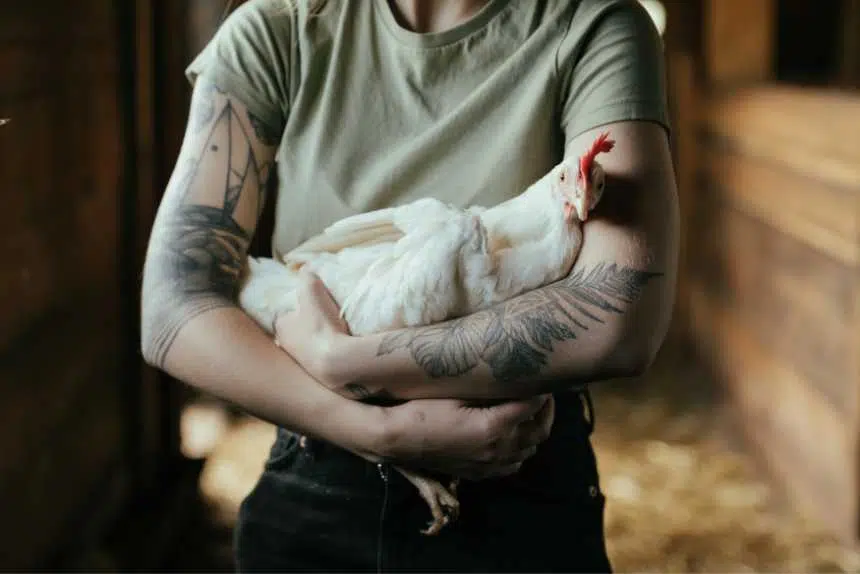
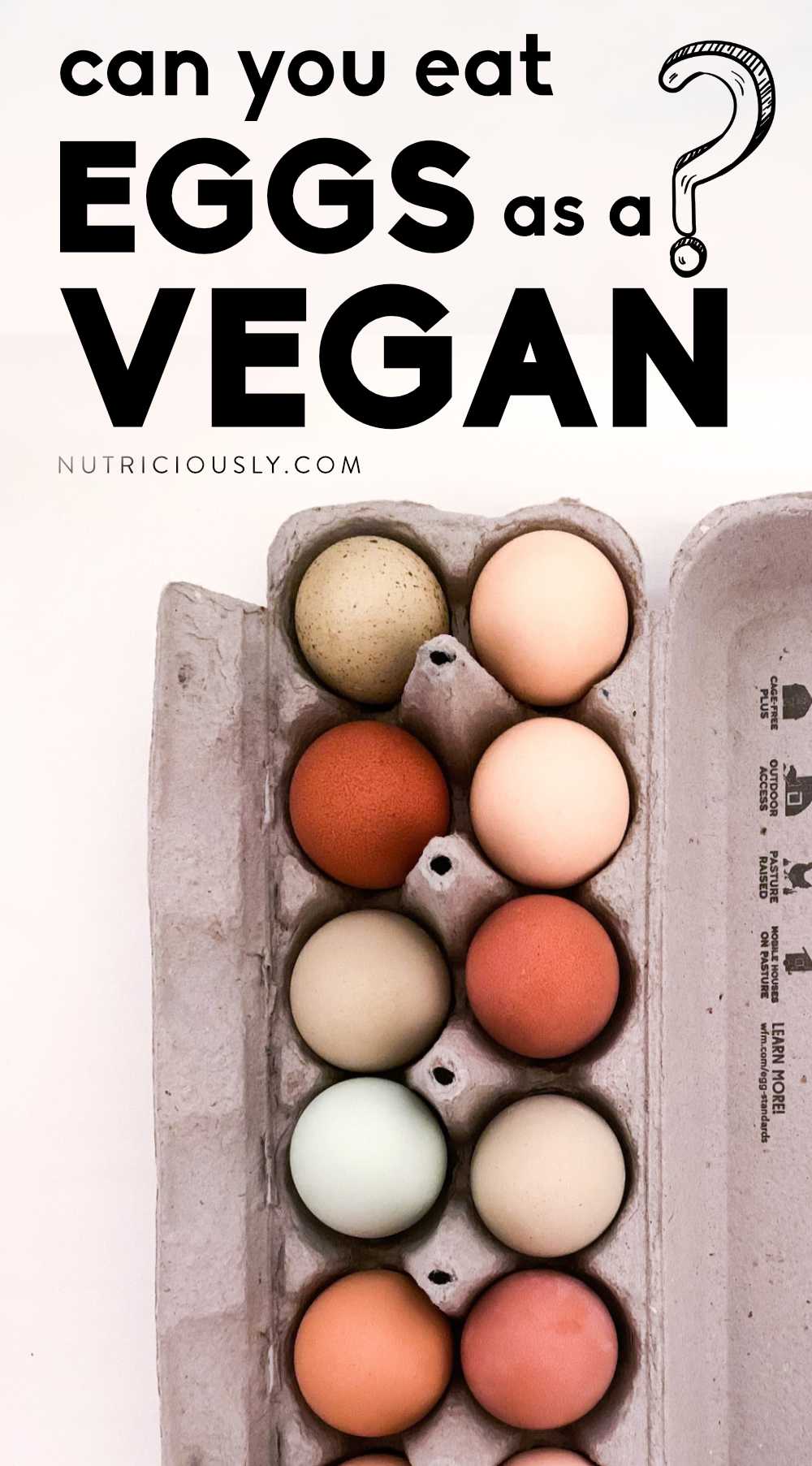



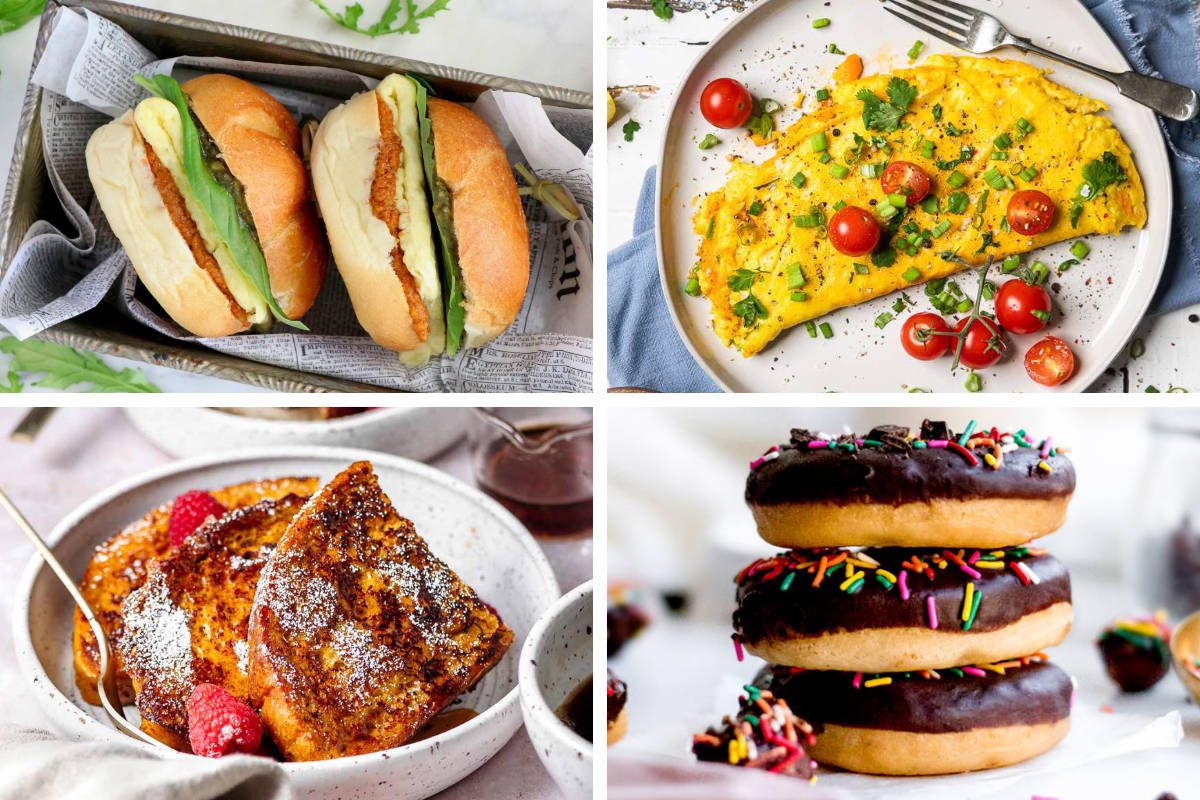
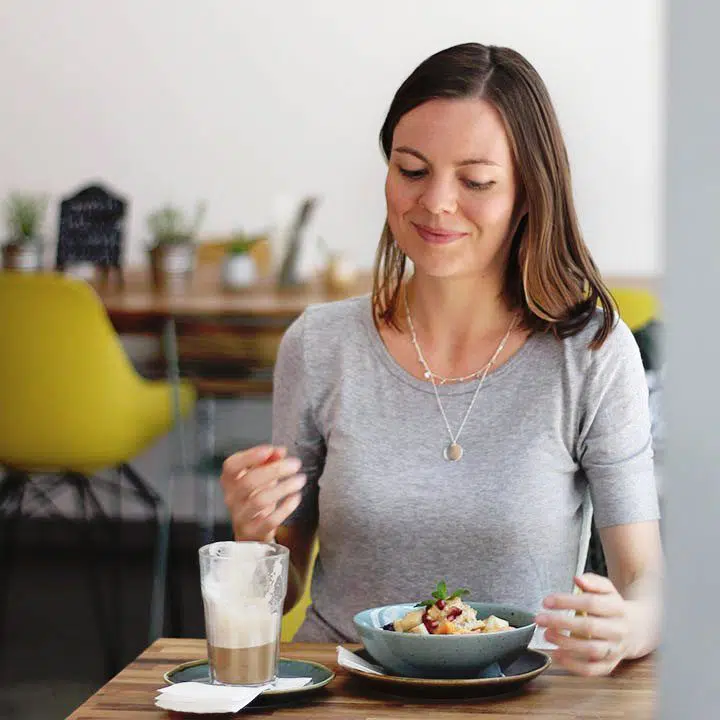
 Alena Schowalter is a Certified Vegan Nutritionist who has been a vegetarian since childhood and vegan since 2012. Together with her husband, she founded nutriciously in 2015 and has been guiding thousands of people through different transition stages towards a healthy plant-based diet. She’s received training in the fields of nutrition, music therapy and social work. Alena enjoys discussions around vegan ethics, walks through nature and creating new recipes.
Alena Schowalter is a Certified Vegan Nutritionist who has been a vegetarian since childhood and vegan since 2012. Together with her husband, she founded nutriciously in 2015 and has been guiding thousands of people through different transition stages towards a healthy plant-based diet. She’s received training in the fields of nutrition, music therapy and social work. Alena enjoys discussions around vegan ethics, walks through nature and creating new recipes.
I red this article and I can’t help but wonder, do blogs also have to be careful with plagiarism? I see some similarities, also similar sentences in the parts about health risks… https://www.forksoverknives.com/whats-wrong-with-eggs/?utm_medium=Mailchimp&utm_campaign=Patient-Beat-PreDiabetes-6/6&utm_source=Email&utm_term=What's-Wrong-with-Eggs
Hi Magda,
the Forks Over Knives article was one of our resources here and it’s very thorough which is why you can find some similarities. After all, there are only so many facts and studies on eggs! I linked to the article for reference/credit in my piece and used it as one source. Nothing wrong with this as I see it! If the original author wouldn’t like us doing that, I’d be happy to rephrase.
Hope this clears things up x
I actually can’t find that many commonalities.
Hi Alena,
While I completely respect the right for an individual to avoid eating eggs for ethical or allergy-related reasons, the body of nutrition research as a whole does not substantially support the claims you make in this article about eggs alone causing or even significantly increasing a person’s risk for chronic diseases like cancer, diabetes, and heart disease. The articles you cited were not double-blind, placebo-controlled studies, which are largely the ones depended upon to draw conclusions about cause-and-effect relationships. At best, the epidemiological studies cited (like the Physicians’ Health Study) can suggest a correlation between eggs and certain diseases, but not a causation. Furthermore, the research cited about methionine fails to mention that it is also an essential amino acid, meaning that the body cannot make it on its own and needs to consume it from foods to avoid nutrient deficiency. My main purpose in writing this message is not to stir up strife or start a massive internet debate, but rather to highlight nutrition misinformation. As a Registered Dietitian practicing in oncology, every day I have to guide individuals making major life decisions about their health, so it is important that I do my homework to make them as informed about nutrition as possible. I hope you take the points I made above (regarding the strength of different types of research and correlation/causation) into consideration in writing future articles. All in all, thank you for writing this blog because I think your recipes look delicious, and I appreciate those who value nutrition and want to educate others, but I also care very deeply about not misleading the public.
Dear Lindsay,
I really appreciate your comment. I think we have a lot in common and I’m always open to anyone pointing out errors in what I wrote! It’s the only way we can learn and evolve. Since I am not an RD myself, I suppose you are better at interpreting research and working on these subjects every day. All I can do is look for the most trusted, unbiased sources and then share them here in a well-structured way. Honestly, I don’t want to talk down on any more foods than is necessary but I deeply trust the research’s findings that eggs have lots of cholesterol and therefore promote CVD. Dr. Michael Greger goes through tons of nutritional research with his team every day and presents the findings on his website… just like these videos:
https://nutritionfacts.org/video/eggs-and-cholesterol-patently-false-and-misleading-claims/
https://nutritionfacts.org/video/who-says-eggs-arent-healthy-or-safe/
Thanks for helping out so many people in your job and I do try to write correct articles all the time. I appreciate your input and would love to know your opinion on Greger’s work.
Best wishes,
Alena
Wow. That was a really productive and respectful conversation. Don’t see that a lot on the internet unfortunately.
Thank you so much for this amazing information!! It’s great reinforcement for me!!!
You’re welcome, Monica! Glad you like it.
Thank you so much for this article. I’ve been looking for good resources to add to my list of vegan resources on my recipe blog. I have been vegan for a year and am not too good at explaining things to non-vegans without going full preachy, so am making list of article links on various aspects of veganism. I would like to include this post in that list. If you aren’t comfortable with this please let me know. Great article, thanks again, Hannah
Thank you for this article ! As a new vegan I’m still trying to figure out how to have the best well balanced diet. Althought eggs yolks are high in cholesterol, i wonder if the egg white is a better option. I live on a farm where we have true free-range chickens and wonder if only consuming the eggwhite has any disadvantages though i can’t seem to find that answer?
Thanks for the help!
-Lauren
When considering nutrition, there are hundreds of thousands of nutrients and minerals which are found in plants which don’t even exist in meat/eggs/dairy. All essential amino acids (dietary proteins) come from plants (not animals, as stated by the supposed nutritionist above). They come from nitrogen in our air, converted by plants into amino acids – all the other proteins, we make for ourselves. As for the cholesterol debate, there is ZERO dietary cholesterol in a vegan diet (cholesterol is an animal hormone and comes only from animals) – humans make their own cholesterol to demand – any dietary cholesterol from eggs/meat/dairy is an excess.
For people trying to argue that there’s no evidence that veganism is healthier, there are 3 main things to consider:
1 – The china study, the largest peer-reviewed independent study into nutrition and disease concluded that ALL of the leading major human diseases (today’s top 15 leading killers) are preventable and reversible with a wholefood plant-based diet. It also concluded that consuming animal proteins and hormones is extremely detrimental to human health and massively increases ones risk of death from major diseases. The worlds top University studies also agree that: “the optimal amount of animal protein in the human diet is precisely zero.” Plant-based Doctors, researchers and nutritionists are consistently finding that meat, eggs and dairy are harmful to humans and the only diet EVER to consistently reverse the leading cause of human disease is a wholefood plant-based diet.
3- Legislation: It is now illegal in UK, Europe and some parts of America for companies and health professionals (such as doctors or nutritionists) to list meat, eggs and dairy as “Healthy”, Wholesome” “Nutritious” or “Part of a healthy balance diet”. Meat and eggs and milk are now also more prevalently being regarded and labelled with warnings such as “carcinogenic”, “class 1 carcinogen” and “not safe for human consumption.” The major body of research and evidence (past and present) completely supports these finding.
Thank you. This article has “changed my heart” and I will not consciously eat eggs anymore. If not for health reasons, then at least for the sake of those chickens who enjoyed their freedom so much. I was sobbing!
wow, all this about eggs is shocking.
very curious where are you studying to become a vegan nutritionist? very interesting as I am a nutrition coach myself and I would love to go this way.. thanks!
you might want to look into the eCornell certification program :)
For the person who consumes the occasional egg, how do you feel about eggs with the humane label?
Thanks for the comment! Have you looked into what the label ‘humane’ means and what the life of this chicken actually looks like? Here’s a good video I just watched today (non-graphic): https://youtu.be/7DxopX9co74?t=487
We personally think that eggs belong to the chicken who laid them and are not ours to take, most sanctuaries who allow to let the chickens live out their lives actually feed the eggs back to them instead of eating them.
The question is why would someone need to eat the occasional egg when there are good plant-based alternatives?
Hope this helps — ultimately it’s everyone’s own decision they need to make but sure, there are bad and really bad conditions.
This, “The more ethical you want this to be, the less profitable it becomes.” regarding backyard eggs feels very true to me! I’ve been vegan for 35 years, but I adopted rescue ducks 6 years so and I take care of them as precious pets. I’ve spent over 40,000 on their medical bills alone. They were, sadly, selectively bred to produce massive amounts of eggs and so they have painful reproductive issues. I don’t eat their eggs. But we joke that they are worth $100 each. I don’t see how any eggs can be produced ethically for profit.
I am thinking of going vegan. I was a big egg eater. I never realized the inhumane treatment of egg laying chickens. I’d just go to the store and buy eggs, never thinking of how they got there. Now I know there are alternatives. I am assuming the treatment of poultry to put a chicken cutlet on your plate is no better. My generation was of the school of thought that you can’t get protein from plants. Now I see how the meat industry “ planted “ that idea in me. I am 64 and busted up from a bad auto wreck 21 years ago. I have high cholesterol and a ton of inflammation. Hence the reason I want to get off of the meat based diet I have been on my whole life. I don’t know if I can do it all at once, the older I get the more I think that gradual changes are better and healthier. Thanks for the articles, very informative.
thanks so much for sharing all of this, Dean! I find it especially heart-warming and inspiring when someone who is used to doing a specific thing for many decades feels like they want to change their habit. And I agree, gradual changes lead to more success, no matter your age! I’d love to invite you to our free online course that takes you through the transitioning stages: https://nutriciously.com/course/ Feel free to drop us an email for some personal support!
Best wishes
I’ve been looking everywhere to find if just eating the egg white still has poor health effects and cannot find solid info on it! Do you know if there are any studies done on this?